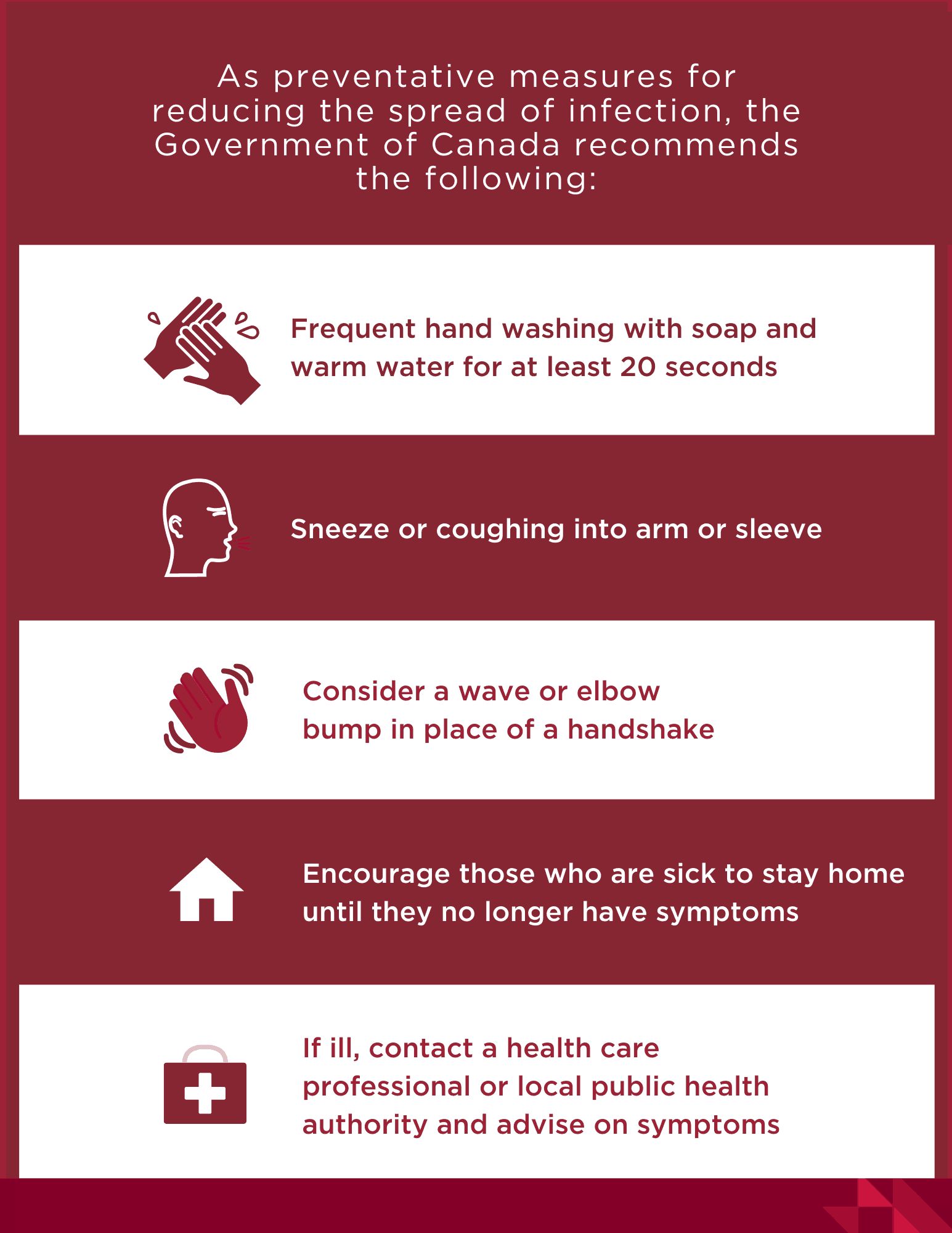As of March 10, 2020, the Government of Canada has confirmed 79 cases of COVID-19 (otherwise known as the coronavirus) in Canada, with 36 confirmed cases in Ontario, 32 in British Columbia (1 death), 7 in Alberta and 4 in Quebec.
These numbers continue to rise by the day. While this incidence rate suggests COVID-19 is not yet prevalent in Canada, employers may want to start considering best practices for responding to the risks posed by COVID-19 and how these measures interact with their obligations under applicable employment, occupational health and safety and privacy legislation.
A pre-emptive review of existing policies and procedures would go a long way to assist employers with providing employees with a safe workplace and being prepared for employee inquiries pertaining to coronavirus-related health and safety concerns. This review should include applicable policies and procedures related to teleworking or "work from home" policies, sick day and sick leave policies, communicable illness policies or pandemic policies. Employers should identify authoritative sources of public health information, such as the Government of Canada, World Health Organization or Centers for Disease Control and Prevention, and stay informed on this issue. Employers should educate their employees about the coronavirus, how it spreads and how to prevent its spread.
Here are some frequently asked questions and answers to help employers navigate concerns related to the coronavirus and the workplace.
What are some preventative measures that we can implement in our workplace?

Further information from the Government of Canada regarding the COVID-19 outbreak can be found here.
Education is important. An employer can help prevent the spread of coronavirus through communicating the Government of Canada preventative measures to its employees and providing further information about proper handwashing techniques and proper sneeze and cough etiquette through measures such as posters promoting such techniques in the workplace or through company-wide e-mail communications.
In addition to providing a clean and hygienic workplace, employers should ensure current policies and procedures address challenges that could arise if an employee is infected with coronavirus or if an employee is concerned about coming to work because of the fear of coronavirus spread. Employees should be encouraged to come forward with any legitimate concerns about their own or other employees' potential coronavirus symptoms or about coming into work out of fear of spreading or communicating the illness.
Can an employee stay home from work if they or their family member are experiencing flu-like symptoms?
The employment standards legislation in some provinces provides employees with a certain number of days of unpaid leave in each calendar year for the health benefit of themselves or an immediate family member, although not all provinces includes such provisions in their legislation. For example, in Saskatchewan, employees are entitled to up to 12 days of unpaid leave related to non-serious illness or injury. In the event of serious illness or injury, employees are entitled to up to 12 weeks of unpaid leave.
Additional contractual entitlement to sick days may also be found in applicable employment agreements, collective agreements or workplace policies. As a result, employees experiencing flu-like symptoms may use these sick days to attend to their needs or the needs of their immediate family members.
Can an employer tell an employee to go home if they appear to be experiencing flu-like symptoms?
As a precautionary measure, employers may wish to direct employees exhibiting flu-like symptoms to stay home to avoid the spread of any virus, including coronavirus. The employer and the employee may also come to an agreement regarding a work from home arrangement in order to ensure an employee has not contracted coronavirus. In doing so, the employer should ensure it has the proper teleworking policies and resources in place to support the work from home arrangement.
Can an employer ask all employees to work from home during a coronavirus outbreak?
Certain American companies such as Twitter, Google, Amazon and Facebook have made headlines for asking or strongly encouraging employees to work from home to help lower the spread of coronavirus. While not all employers can or will go as far as to encourage employees to work from home, if your workplace is considering this as an option, applicable procedures and policies such as teleworking or "work from home" polices should be developed or reviewed in order to be prepared. Temporary measures such as work from home arrangements help ensure that employees that are away from the office may still be able to contribute productively.
What if an employee's job cannot be performed from home?
A substantial amount of the workforce involves work that cannot be completed by an employee from home. What if an employee in this type of position does not want to come in to work?
Workers generally have the right to refuse unsafe work. For example, in Saskatchewan, Section 3-31 of The Saskatchewan Employment Act gives workers the right to refuse dangerous work where a worker has reasonable grounds to believe that an act or a series of acts is unusually dangerous to the worker's health or safety or the health or safety of any other person at the place of employment. If an employee refuses to come to work due to fear of contracting the coronavirus, their employer should respond by carrying out an investigation and, if applicable, take action to eliminate the danger in accordance with the applicable occupational health and safety legislation. Employers should ensure that managers and supervisors are familiar with work refusal obligations and the steps required should an issue be raised by an employee.
In some cases it may be appropriate for employers to include discussion of the risks of COVID-19 and preventative safety measures with their occupational health and safety committees or pursuant to similar processes such as the Hazard Prevention Program which is applicable to federally regulated employers. Consideration of these risks and the implementation of new safety measures may be important for those employers who operate in sectors where there is a higher degree of risk of infection (such as employers in the health care sector), or if there is a confirmed COVID-19 outbreak within a particular workplace.
What can an employer tell employees about travel?
The Government of Canada has posted a travel advisory, updated March 9, 2020, recommending the avoidance of all non-essential travel to China, Iran and Italy due to the outbreak of the coronavirus. Many employers are responding by discouraging employees from travelling to affected areas for business and implementing a broader scoped non-essential travel ban for all employees to restrict the exposure of its staff and business.
Currently Canada has only implemented travel advisories and some additional screening measures, but has not implemented any travel bans. In cases where it is essential for business travel to continue, employers should consult up to date guidance from the Federal Government regarding any additional screening measures or travel restrictions which may affect travel to or from Canada.
Human Rights & Privacy Considerations
In assessing coronavirus-related health and safety concerns, such as asking an employee to stay at home, employers should be mindful of human rights obligations and that employers are prohibited from discriminating against an employee based on protected grounds such as disability, place of origin, or race. Employers should only exclude from the workplace employees who have travelled to affected areas (as identified by the Government of Canada) and who display symptoms or have been exposed to others who have been infected. Exclusions not based on evidence may violate Canadian human rights legislation.
In addition, employers must be mindful that they have certain privacy obligations to keep employees' personal information, including health information, private. An employee's personal health information can only be used or disclosed for the purposes for which it was collected, or where the employee consents to the disclosure of that personal health information.
Conclusion
Overall, employers should exercise flexibility when managing illness-related workplace absences and when preparing their workplace to respond to any potential risk related to COVID-19. The consideration of best practices and its intersection with applicable legislation at this stage will assist the employer with being prepared should Canada see an influx of cases in the future.
The content of this article is intended to provide a general guide to the subject matter. Specialist advice should be sought about your specific circumstances.



